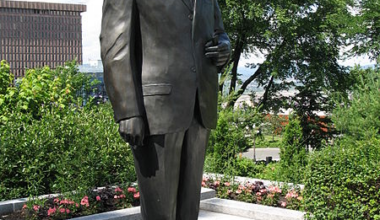It looks like there’s trouble brewing north of the wall. A giant ginger beast that has lain dormant for the past three years has awoken, possibly the illegitimate love child of Ed Sheeran and Nicola Sturgeon. Located deep in the basement of Holyrood, it has now broken free from its chains. All kidding aside, I am speaking of Police Scotland’s ‘Hate Monster’, a cringeworthy but sinister public information campaign that epitomises one of the most draconian hate speech laws in Western Europe (the unamended version of which was opposed by both the National Secular Society and the Catholic Church a few years ago).
If the Scottish Government is to be believed, a roving band of bigoted individuals is attacking its citizens. In an attempt to deprogram the hate-filled hoi polloi from their rabid bigotry, the Hate Monster has been let loose. In an 80-second video, a character eerily reminiscent of Captain Caveman grows larger, fuelled by hate: ‘When ye feel angry; he’ll be there, feeding aff they emotions. Getting bigger and bigger, till he’s weighing ye doon.’ Since this online periodical’s editor is Scottish, I made sure to quote the proper vernacular to avoid committing a hate crime. [Och aye! Very wise! – Ed.]

SCREEN GRAB FROM THE POLICE SCOTLAND VIDEO VIA YOUTUBE.
Scotland’s Hate Crime and Public Order Act went into effect on 1 April. It was created to consolidate existing hate crime legislation and safeguard minorities who were thought to be particularly vulnerable. In 2020, after the George Floyd murder, then-Scottish Justice Secretary Humza Yousaf stated that ‘We cannot, and will not, tolerate hate crime, prejudice or discrimination of any kind.’ This came just a couple of months after he introduced the Hate Crime Bill in the Scottish Parliament. More recently, the First Minister has called for a ‘zero-tolerance approach to hatred.’ In addition to a long list of protected characteristics, including age, disability, religion, sexual orientation, and transgender identity, the Act establishes a new offence of ‘stirring up hatred’.
According to Police Scotland, a hate crime is defined as ‘Any crime which is perceived by the victim or any other person as being motivated (wholly or partly) by malice or ill will towards a social group.’ Put another way, it is a perception-based crime: the alleged victim’s—or witnesses’—subjective assessment alone is sufficient to classify an incident as a hate crime, without the need for any additional evidence.
The Act’s defenders contend that this is an incorrect interpretation of the law. They argue that it is necessary for a ‘reasonable person’ to agree that an incident is threatening or abusive enough to constitute a hate crime. But there were already laws pertaining to death threats and every liberal democracy is based on laws that protect people from physical harm. So what of abuse? Words are not violence. This law conflates physical and verbal abuse. When someone verbally attacks you, the worst you will suffer is a bruised ego. It does not put a restriction on your freedom.
And what of the effects on the alleged transgressors? You might be recorded as having participated in a non-crime hate incident (NCHI), even if you have not broken the law. If this occurs, you are unlikely to be informed, but it could become apparent when your employer conducts a disclosure check on you. Although NCHIs were not introduced as part of the new Hate Crime Act, it is a reasonable suspicion that more of them will be recorded now. The Court of Appeal (England and Wales) declared in 2021 that the recording of NCHIs as it had been done until then was unlawful. Despite this, police in England and Wales persisted, issuing 6,489 of them between June and November of last year, many of which involved ‘petty rows’. The Scottish police are merely doing the same.
It appears that elite paranoia about the general population is the motivation behind the Hate Crime Act. Hundreds of sites have been made available by Police Scotland for the public to report hate crimes, which range from a Glaswegian sex shop to a mushroom farm in North Berwick. You can visit one of these snitching centres located across the length and breadth of the nation and submit an anonymous report about someone. What could possibly go wrong?
If Harold Wilson’s oft-quoted observation that ‘a week is a long time in politics’ is correct, then the Hate Crime Act’s first one has been an unmitigated disaster. In the seven days since the Act’s enactment, Police Scotland logged over 6,000 reports. The police are wasting valuable resources on overtime due to the unceasing influx of incidents, costing hundreds of thousands of pounds, while actual crimes like burglary remain unsolved.
Perhaps the worst aspect of the Act is that the dwelling defence has been removed, so people now face the possibility of prosecution for remarks they make while at home. Fines and jail terms of up to seven years are among the available forms of punishment.
And the Act is a hostage to the law of unintended consequences. As a senior Scottish police officer said, people might ‘use the legislation to score points against people who sit on the other side of a particularly controversial debate’. Thus, police might be forced to adjudicate between warring parties seeking revenge.
Like all laws that aim to outlaw offence, this one appears to have been thrown together on the fly.
Meanwhile, Thomas Ross KC suggested that football fans might report rival supporters using the Act. Given the fierce rivalry and sectarian history of Old Firm football, this could prove a real headache for the police. Indeed, a number of reports regarding hate crimes were made after a match on 7 April according to The Times, including from people who overheard Rangers fans’ singing on the TV and radio, though the precise figure has not been verified.
Like all laws that aim to outlaw offence, this one appears to have been thrown together on the fly. The best example of the ad hoc nature of the Act was provided by Siobhan Brown, the Minister for Victims and Community Safety, who stated that individuals may be subject to investigation if they misgender someone. J.K. Rowling chose to test the new law on April Fool’s Day, which, ironically, was also the day the Act went into effect. The gender critical feminist posted on Twitter/X about a number of men convicted of sex crimes now identifying as women. She said, ‘If what I’ve written here qualifies as an offence under the terms of the new act, I look forward to being arrested when I return to the birthplace of the Scottish Enlightenment.’
Thankfully, the police declared that the Harry Potter author’s tweets were not criminal. Additionally, they ignored reports against Humza Yousaf, who became a target for his now-infamous speech in 2020 in which he effectively criticised Scotland for being too white. Naturally, this has led to accusations that the police are selectively enforcing the new law. Take the Scottish Conservative MSP Murdo Fraser, who had an NCHI recorded against him for tweeting that identifying as non-binary was like identifying as a cat. Fraser now intends to challenge this in court.
I write a lot about culture, so let me share a humorous example that encapsulates our submission to political correctness. Scot Squad was a Scottish mockumentary series about a fictional police force, and one episode was incredibly prescient. In it, the chief repeatedly digs himself into a bigger hole in an effort to make up for a relatively trivial comment. Feeling he is always offending someone, his long apology never ends.
A recent poll indicates that 45% of Scots support the repeal of the law, while 21% support it. This is a heartening indication that the spirit of liberty in Scotland is not dead yet. The more people learn about it, the more resistance they seem to be putting up. We owe a debt of gratitude to J.K. Rowling for making the general public aware of the ridiculousness of this law. Ironically, it took a woman with a big set of balls to show up this illiberal legislation.
Further reading
From Satan to the Hate Monster, by Emma Park
Faith Watch, March 2024, by Daniel James Sharp
The return of blasphemy in Ireland, by Noel Yaxley








Your email address will not be published. Comments are subject to our Community Guidelines. Required fields are marked *
Donate